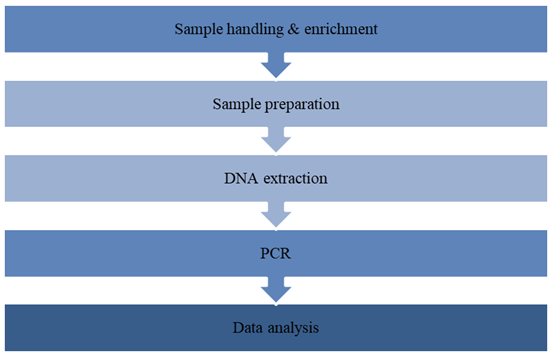Salmonellae are gram-negative, flagellated, facultatively anaerobic bacilli, nonlactose fermenting, and nonspore forming. They multiply in the small intestine, colonising and subsequently invading the intestinal tissues, producing an enterotoxin and causing an inflammatory reaction and diarrhoea. The organisms can get into the blood stream and/or the lymphatic system and cause more severe illnesses. Salmonella are one of the most common causes of foodborne illness in humans, most infections in humans result from eating contaminated food or drinking contaminated water. Sources of Salmonella infections include foods of animal origin, dairy products, pet food, fresh produce, and foods contaminated during processing.
 Fig.1 Salmonella Typhimurum (red) invading cultured human cells.
Fig.1 Salmonella Typhimurum (red) invading cultured human cells.
PCR is a fast, efficient and effective method for salmonella detection, which is widely used to detect Salmonella in naturally or artificially contaminated food samples and fecal samples.
The research team of Creative Biogene has rich experience in the fields of molecular biology and gene diagnosis. Creative Biogene can provide you with salmonellae detection of meat, dairy products, pet food and fecal based on PCR technology.

Diagnosing salmonella infection requires testing a specimen, such as stool (poop), fecal swab, blood or food.
You can customize the salmonellae test by phone or email, and our colleagues will reply your inquiry within three working days.